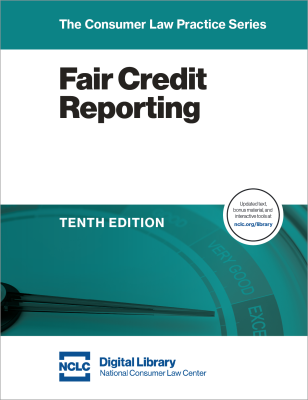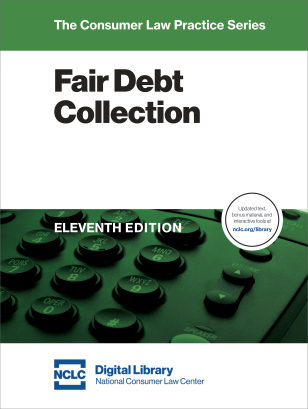A Congressional amendment, a First Circuit decision, two CFPB administrative issuances, a CFPB report, and a Veterans Administration rule all will have significant consequences for consumer reporting under the Fair Credit Reporting Act (FCRA). This article provides the highlights of these recent developments and their implications for consumers, advocates, and FCRA practitioners.
New FCRA Protections for Human Trafficking Victims
One of the surprises from late 2021 was an amendment to the FCRA, new section 605C (likely to be codified as 15 U.S.C. § 1681c-3). The House passed the amendment as the Debt Bondage Repair Act (H.R. 2332). In the Senate, it was tucked in the National Defense Authorization Act (NDAA), Public Law No. 117-81, § 6102 (2021), which is a highly popular measure passed every year to fund the military.
New FCRA § 605C sets up a process whereby a survivor of a “severe form of trafficking” or “sex trafficking” can prevent consumer reporting agencies (CRAs) from reporting adverse information that is a result of such trafficking. These terms are defined by reference to definitions found in section 103 of the Trafficking Victims Protection Act of 2000, 22 U.S.C. §§ 7101–7114. Section 103 of that Act defines ‘‘severe forms of trafficking in persons’’ as:
(A) sex trafficking in which a commercial sex act is induced by force, fraud, or coercion, or in which the person induced to perform such act has not attained 18 years of age; or
(B) the recruitment, harboring, transportation, provision, or obtaining of a person for labor or services, through the use of force, fraud, or coercion for the purpose of subjection to involuntary servitude, peonage, debt bondage, or slavery.
22 U.S.C. § 7102(11).
Section 103 also defines ‘‘sex trafficking’’ as “the recruitment, harboring, transportation, provision, or obtaining of a person for the purpose of a commercial sex act.” 22 U.S.C. § 7102(12).
If a survivor fits within these definitions, the process under FCRA § 605C to be able to prevent or remove information from consumer reports presents procedural hurdles. The trafficking survivor must obtain “trafficking documentation,” which includes both:
(A) a determination that they are a victim of trafficking made by either a Federal, State, or Tribal governmental entity or by a court of competent jurisdiction; and
(B) documentation that identifies the items of adverse information that should not be furnished by a consumer reporting agency because the items resulted from a severe form of trafficking or sex trafficking.
FCRA § 605C(a)(1).
Such documentation may prove to be a barrier for many survivors. Also, it is unclear from what entity or what type of documentation is necessary to establish that adverse information resulted from trafficking. However, section 605C(c) does require the CFPB to issue a rule implementing its provisions, including establishing a method for survivors to submit trafficking documentation to CRAs, so hopefully the Bureau will resolve the lack of clarity. Section 605C becomes effective thirty days after the CFPB issues a rule to implement it.
First Circuit Allows States to Better Protect Consumers from Consumer Reporting Abuses
FCRA § 1681t contains the Act’s preemption restrictions. Subsection (b) contains numerous specific provisions that specifically preempt state laws concerning different FCRA sections or subsections. See NCLC’s Fair Credit Reporting § 10.7. In a groundbreaking decision, the First Circuit in Consumer Data Industry Association v. Frey, 2022 WL 405956 (1st Cir. Feb. 10, 2022), held that an important one of these preemption provisions should be narrowly interpreted.
The First Circuit held that the FCRA does not preempt states from regulating the contents of consumer reports, except in specific circumstances. This case involves two Maine statutes, one of which addresses medical debt (Me. Rev. Stat. Ann. tit. 10, § 1310-H(4)) and the other addresses debts arising from economic abuse (Me. Rev. Stat. Ann. tit. 10, § 1310-H(2-A)).
At issue was whether these laws were preempted under FCRA § 1681t(b)(1)(E), which states that “No requirement or prohibition may be imposed under the laws of any State—(1) with respect to any subject matter regulated under....(E) section 1681c of this title, relating to information contained in consumer reports.” See NCLC’s Fair Credit Reporting § 10.7.3.3 (FCRA preemption with respect to CRAs). FCRA § 1681c, in turn, primarily governs obsolescence, veteran's medical debt, and other specific items. See NCLC’s Fair Credit Reporting § 5.2 (obsolescence); id. § 5.4.5 (veteran’s medical debt).
The district court had held that FCRA § 1681t(b)(1)(E) preempted states from adopting any law that regulates the contents of a consumer report. Consumer Data Indus. Ass’n v. Frey, 495 F. Supp. 3d 10 (D. Me. 2020). Based on a meticulous and detailed parsing of the statutory language, the First Circuit reversed, stating “we conclude that Section 1681t(b)(1)(E) narrowly preempts state laws that impose requirements or prohibitions with respect to the specific subject matters regulated under Section 1681c.” Consumer Data Indus. Ass’n v. Frey, 2022 WL 405956, at *10 (1st Cir. Feb. 10, 2022). The First Circuit remanded the case to determine whether this narrower scope of preemption affected the Maine laws and whether another of the FCRA preemption provisions applied to the Maine economic abuse law.
Implications of First Circuit Decision for Tenant Screening
The First Circuit decision in Consumer Data Indus. Ass’n v. Frey means that state legislatures should feel less constrained to adopt laws that directly regulate the contents of consumer reports. For example, many states are concerned about the impact of tenant screening on renters displaced as a result of the pandemic. States may wish to prohibit the reporting of certain eviction records, such as dismissed actions or where the renter prevailed.
Unfortunately, landlords often deny rental applications based on the mere report of an eviction proceeding, even where a court never found the renters at fault, shutting these renters out from housing opportunities or even placing them at risk of homelessness. States in the First Circuit are now empowered to address this problem directly, and other states have a strong argument that they are able to do so as well.
CFPB Advisory Opinion: Name-Only and Insufficient Matching Criteria Are Not Reasonable Procedures
On November 4, 2021, the CFPB issued an advisory opinion affirming that CRAs—including tenant and employment screening companies—are not using reasonable procedures to assure maximum possible accuracy as required under FCRA § 1681e(b) if they use inadequate matching procedures, such as name-only matching, to match information to consumers. See NCLC’s Fair Credit Reporting § 4.3.3 (discussing matching issues and § 1681e(b)). Name-only matching is the practice of matching information from a source to a consumer based solely on whether the consumer’s first and last name are identical or similar to the first and last names associated with the information from the source, without verifying the match using additional identifying information.
The advisory opinion highlights that consumer complaints to the Bureau about “incorrect information on your report” have represented the largest percentage of complaints to the Bureau about consumer reporting for at least the last five years, and such inaccuracies can be attributed in part to errors created during the matching process. The advisory opinion also emphasizes that inaccurate reporting—such as the inclusion of somebody else’s criminal or eviction record in a tenant or employment screening report—impedes the ability of renters and job seekers to secure new rental housing, find a job, or otherwise recover from the economic effects of the COVID-19 pandemic.
The advisory opinion explains that name-only matching is particularly likely to lead to errors in consumer reports because many consumers have the same or similar names. It also emphasizes that the risk of mistaken identities is likely greater among Hispanic, Black, and Asian communities because there is less surname diversity in those populations compared to white populations, i.e., more consumers share the same last name in those communities.
Significantly, the advisory opinion makes clear that inadequate matching procedures other than name-only matching also violate the FCRA, explaining that “multiple additional elements beyond names may often be required” to satisfy the § 1681e(b) standard. The Advisory Opinion further clarifies that it does not create a safe harbor to use insufficient matching procedures that involve multiple identifiers, noting that name combined with date of birth could lead to cases of mistaken identity as well. The Bureau also notes the “relative lack of burden” for a CRA to use additional personal identifiers or to not include information in a report based on name-only matching.
Warning About Use of Data Brokers That Practice Inadequate Matching
The CFPB Advisory Opinion also warns about the use of data brokers. The Advisory Opinion explains that some CRAs obtain information from a data broker, database, or other source that does not have or use identifying information other than consumers’ names and clarifies that it is not a reasonable procedure for a CRA to simply include information from such sources without taking additional steps to match the information to the consumer.
CFPB Warning on Use of Disclaimers: A Response to the Eleventh Circuit?
The CFPB Advisory Opinion notes that it interprets the FCRA § 1681e(b) requirement of “reasonable procedures to assure maximum possible accuracy” “to include as an integral component that the information in fact pertains to the consumer who is the subject of the report.” And, in his statement accompanying the advisory opinion, Director Chopra explicitly “warn[s] [CRAs] against trying to simply evade their responsibilities under the FCRA simply by issuing a disclaimer that their report might not be matched to the right person.”
This portion of the advisory opinion could be a direct response to and rejection of Erickson v. First Advantage Background Services Corporation, in which the Eleventh Circuit held that a background screening company did not violate FCRA § 1681e(b) where the report included a disclaimer stating that a sex offender record was located using a name-only search, that the record might not belong to the plaintiffs at all, and that further review of the state sex offender website was required to determine if the record belonged to the plaintiff. 981 F.3d 1246, 1252–1253 (11th Cir. 2020). Disclaimers are discussed in NCLC’s Fair Credit Reporting § 4.2.4.1.3.
CFPB Report on Complaints Against the Nationwide CRAs
In January 2022, the CFPB issued a scathing report on how the Big Three nationwide CRAs (Equifax, Experian, and TransUnion) failed to meaningfully respond to almost all of the 700,000 complaints filed against them between January 2020 through September 2021. See CFPB, Annual Report of Credit and Consumer Reporting Complaints: An Analysis of Complaint Responses by Equifax, Experian, and TransUnion (Jan. 2022). According to the CFPB, in 2021, the nationwide CRAs reported relief in response to less than 2% of complaints that consumers filed with the Bureau, down from nearly 25% of complaints in 2019.
The CFPB’s report noted that these 700,000 complaints against the nationwide CRAs constituted more than 50% of all complaints received by the CFPB, making credit reporting the most complained industry for that period. The CFPB found the Big Three often failed to provide substantive responses, especially when they suspected that the complaints were sent in by third parties, most particularly credit repair organizations. The CFPB took special efforts to make clear that consumers are permitted to have third-party representatives submit complaints on their behalf, and that the FCRA requires the nationwide CRAs to review those complaints. See NCLC’s Fair Credit Reporting § 4.5.2.5 (whether a third party can submit a dispute).
Most ominously for the Big Three, the CFPB characterized their responses to these complaints as “rais[ing] serious questions about whether they are unable—or unwilling—to comply with the law.” In a press release for the report, CFPB Director Rohit Chopra also stated that “America’s credit reporting oligopoly has little incentive to treat consumers fairly when their credit reports have errors,” and that the report “ is further evidence of the serious harms stemming from their faulty financial surveillance business model.”
Other findings from the report include:
- Complaints described how consumers are caught in an automated system where they are unable to have their problem addressed—a familiar story to anyone who’s read NCLC’s reports Automated Injustice (2009) and Automated Injustice Redux (2019). See NCLC’s Fair Credit Reporting § 4.5.6 (describing the automated nature of the nationwide CRAs’ dispute systems). The CFPB report noted this was especially problematic for consumers who are making large financial transactions, such as buying a house, or applying for housing or employment.
- Consumers described in their complaints the significant burden associated with attempting to correct inaccurate information, which were compounded when they are managing other personal issues. Some consumers reported discovering that debts (such as medical bills) had been reported to their credit report without their knowledge—a phenomenon called “parking” which should no longer occur under the CFPB’s new debt collection rule, Regulation F, 12 C.F.R. § 1006.30(a) , as examined at NCLC’s Fair Debt Collection § 8.12.
- Some consumers described paying bills they did not think they owed because they were unable to remove them and due to concerns about the effect of the debt on their credit report and credit score.
- Consumers are caught between furnishers and the Big Three, with both parties pointing fingers at one another over errors, which can be especially difficult for identity theft victims.
- One of the primary tools used by the Big Three to identify what they suspect are complaints from credit repair organizations is “similarity in narrative text.” But the CFPB noted that “with the growth of educational content and providers—and the circulation of template language—it becomes increasingly difficult to distinguish template language used by a credit repair organization from template language used by a consumer” and cited as an example a consumer using the CFPB’s own sample dispute letter or a sample from the Federal Trade Commission.
January CFPB Bulletin: The No Surprises Act Creates New Obligations for CRAs and Debt Collectors
The CFPB has recently released a Compliance Bulletin and Policy Guidance (Jan. 13, 2022) regarding the obligations of debt collectors and consumer reporting agencies in light of the No Surprises Act. That Act provides new consumer protections from “surprise” medical bills, i.e., bills from out-of-network healthcare providers for which the consumer’s insurer did not pay the full amount charged by the provider. The new protections ban surprise bills for emergency services, for non-emergency services by out-of-network providers who work at an in-network facility, and air ambulance services from out-of-network providers. More information is available on the Centers for Medicare & Medicaid Services (CMS) No Surprises Act website and will be forthcoming in an update to NCLC’s Collection Actions § 9.3.
The CFPB Bulletin warns debt collectors against dunning for medical bills that are not allowed by the No Surprises Act or furnishing information to the nationwide CRAs about such invalid debts. Such practices may give rise to significant legal liability under the Fair Debt Collection Practices Act (FDCPA) and the FCRA. The bulletin also advises the nationwide CRAs that the accuracy and dispute obligations imposed by the FCRA apply to debts stemming from charges that exceed the amount permitted by the No Surprises Act.
The CFPB’s statement regarding the obligations for the nationwide CRAs is especially significant, as it appears to implicate the holdings of many courts that the CRAs are not required to resolve “legal disputes,” as discussed in NCLC’s Fair Credit Reporting § 4.5.3.4.6. One would expect that CRAs would argue that resolving a dispute as to whether an out-of-network provider’s bill violates the protections of the No Surprises Act involves a legal dispute. Yet the CFPB’s Compliance Bulletin requires the CRAs to resolve such disputes.
New Veterans Administration Rule on Furnishing Medical Debt to CRAs
On February 2, 2022, the Department of Veterans Affairs (VA) issued a new rule, 31 C.F.R. § 1.916, Threshold for Reporting VA Debts to Consumer Reporting Agencies (effective Mar. 4, 2022), regarding when that agency will report outstanding debts to the CRAs. See 87 Fed. Reg. 5693 (Feb. 2, 2022). Such debts primarily consist of medical bills and benefits overpayments. Under its new rule, the VA will only report debts that meet all of the following criteria:
- The VA has exhausted all other debt collection efforts;
- The VA has determined the individual responsible is not catastrophically disabled or entitled to free medical care from the VA; and
- The outstanding debt is over $25.
38 C.F.R. § 1.916(c).
Coupled with the other changes, the VA expects that these changes will result in a 99% reduction in debts that the agency reports to CRAs. According to the VA, approximately 60,000 delinquent VA debts were previously referred to the CRAs each year.




